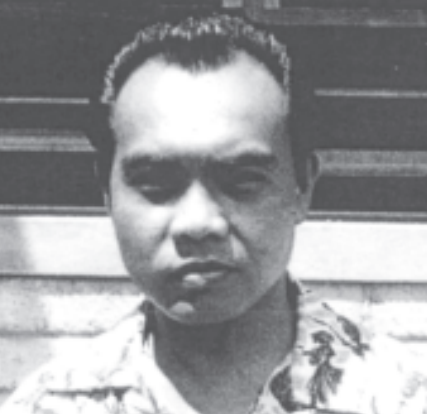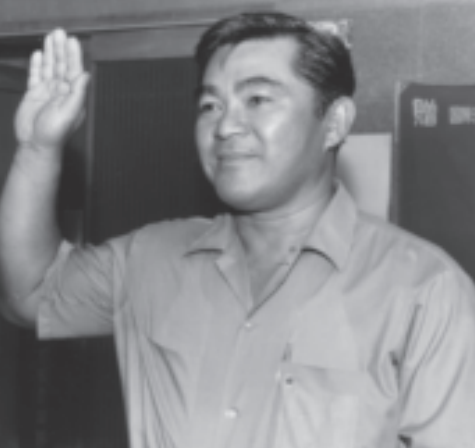
Pepito Ragasa passed away on April 9, 2014 at the age of 90. He was a long-time member of the ILWU, a Business Agent for ten years, and was heavily involved in the Union and his community. Pepito is survived by his wife Alice; son Guy; brother Dado Rola, one grandchild and two great-grandchildren. William Kennison, retired Maui Division Director, gave the following eulogy at Pepito’s service
Pepito Ragasa was a many-faceted man. He was a family man, a pillar of the community, a respected Filipino, a devout Catholic, and a union leader.
I have known Pepito for 40 years because of our mutual involvement with the ILWU. Pepito came to Hawaii from the Philippines in 1946 on board the S.S. Maunawili along with 6,000 other Filipino contract laborers (or “sakada”) heading to work on the sugar and pineapple plantations in Hawaii and hoping to make a better life for themselves. In preparation for what was to be the Great Sugar Strike of 1946, the ILWU had organizers on the ship who talked with the Filipino workers and got them to sign union cards. Pepito said he signed a card not knowing what he was signing, but he never regretted his decision.
Pineapple Company, but after a year, he was hired by Hawaiian Commercial and Sugar Company in 1947. At HC&S, Pepito worked in the mill as a utility man, but eventually got into the trades progression program and became a journeyman welder. Pepito didn’t have much education in the Philippines but studied hard and got his G.E.D. from Baldwin High School.
The ILWU unit at HC&S recognized Pepito’s leadership potential and soon after he went to work at HC&S, he was elected unit secretary. Pepito was later elected unit vice chair, then chairman of the unit, which, at the time, had more than 1,000 members. Pepito also served on the union’s Local Executive Board, the second-highest governing body that made decisions for the Local Union between conventions.
Pepito became a well-respected and popular rank-and-file leader at HC&S. In fact, through his involvement with the ILWU’s Maui Division, he was known throughout Maui and decided to run for and won the position of Business Agent in 1976. As a B.A., Pepito also assumed the responsibilities of Membership Service Director, helping countless members with immigration issues, workers’ compensation, unemployment insurance, and the like. He was always forthright and compassionate in his dealings with the members, and they respected him for his honesty and concern. Pepito served as an ILWU business agent on Maui until his retirement in 1986.
In his job with the ILWU, Pepito assisted workers from various industries and was respected for his knowledge and fairness. He had to understand the type of work the members did, how their contracts were similar or different, and the culture of various ethnic groups. Pepito was wellspoken and could relate to all workers.
Yet he was most effective among Filipino workers. Pepito often interpreted for other business agents who did not speak the Filipino language and was widely seen as a resource within the union. The Filipino community also recognized his leadership abilities and elected him to responsible positions in Binhi At Ani, the Maui Filipino Community Council, the Maui Filipino Catholic Council, the Diocesan Congress of Filipino Catholic Clubs, and the United Filipino Council of Hawaii. Pepito won numerous awards as a model Filipino leader. In 2006, Pepito was Grand Marshal for Maui County Fair as a Maui sakada and one of the top 50 “Outstanding Filipinos of Maui Centennial and Gintong Pamana.”
Pepito also believed that public service was important for ILWU leaders to stay in touch with the community and with issues affecting union members. During his career at the ILWU, Pepito served on several boards and commissions—the Maui Police Commission, the Selective Service System, Maui County Commission on Employment of the Handicapped, Maui Traffic Council, Maui Liquor Control Commission, and the Board of Professional Engineers, Architects, and Landscape Surveyors. Pepito also served as a board member of the J. Walter Cameron Center and the Kahului Filipino Community Association and as advisory council member of Borthwick Mortuary Services.
Pepito was a determined, hard-working man. He wanted to come to Hawaii so he convinced the recruiters in the Philippines that he was a laborer. He wanted to get an education so he studied and got his G.E.D., then became a journeyman welder. He wanted to be active in his union, the ILWU, so he got involved in the sugar strike in 1958, helping to keep his fellow workers together. He wanted to be a union leader so he ran for office and won election several times over. He wanted to serve his community so he volunteered for numerous organizations and lent them his knowledge, his expertise, his leadership skills. He wanted to be a family man so he married Alice and raised his only son, Guy.
Pepito led a long, full life. We mourn his passing, but we celebrate his life. Pepito accomplished more than most in his lifetime. From a struggling immigrant from the Philippines, Pepito became a leader in the community, both respected and admired. The ILWU is grateful to have had Pepito among its ranks, and I feel blessed to have had him as a mentor.
Hawaii Division’s Akira Omonaka—a life well lived
Akira Omonaka passed away on May 9, 2014 at the age of 86. Akira retired as an ILWU business agent in 1991, but he was much more than his title would suggest, especially to those he represented and mentored.
Akira left school in the eighth grade to help support his family. He recalled taking one of the sugar plantation’s donkeys down to the mill, with flies swarming around him, while classmates riding the bus to high school passed by and waved at him. He said that at the time he put his head down in shame, but being part of the ILWU taught him that workers should always be proud of the work that they do, no matter how difficult or dirty.
He earned the equivalent of a high school diploma in his thirties by taking General Equivalency Development (G.E.D.) tests, and went to trade school to study drafting—all while he was working full-time. But like many union leaders from the sugar industry in those days, Akira was mostly self-taught and educated through his life experiences. He was intelligent, articulate, and could hold his own among those with much more formal education than he had.
For almost 20 years, Akira worked in the sugar industry—first for Hakalau Sugar Company, then Pepeekeo Sugar Company. He was a machinist by trade but made his mark as a unit leader for the ILWU. Akira was just a young man when he was elected unit chairman at Hakalau. At Pepeekeo, he moved up in union office quickly, being elected as first vice chair, then chair.
After serving on the Local Executive Board for a time, Akira demonstrated his leadership skills and was elected a business agent for Hawaii Division in 1969. He served in that capacity for 22 years until his retirement in 1991.
Akira was of the “old school.” He believed in hard work. He believed in honesty and integrity. He believed in service. He believed in his union, the ILWU. He may have seemed gruff and tough at times to his peers, but he wanted them to live up to the history and reputation of the ILWU and build it to even greater heights. The members he represented also knew him as someone who listened carefully to their concerns and who took the time to try and teach them how to improve their work and family lives.
Akira represented ILWU members throughout the Big Island and served them well. He logged thousands of miles each year traveling to Kau, Kohala, and Kona to handle grievances and get members out of one scrape or another. He was a skillful negotiator whose word was his bond. He was a fierce adversary across the table, yet he easily earned the respect of management because of his fair and responsible actions. He assisted members injured on the job with their workers’ compensation claims, he helped those who were laid off or even fired apply for unemployment benefits and helped them appeal denials. He guided members considering retirement about how to prepare for life after work.
In the tradition of ILWU officials, Akira believed in public service. He served on the Hawaii County Charter Commission for 16 years and as a member of the Statewide Health Coordinating Council (SHCC) for more than five years. On SHCC, Akira represented ILWU members and retirees who relied on the safety net services provided in rural areas through the Hawaii Health Systems Corporation, which ran hospitals throughout the state.
As dedicated as Akira was to the ILWU and the community, there was never any doubt about his love and concern for his family. At his memorial service, his son Guy spoke about the lessons he learned from his father—about duty and service, about always being prepared, about developing relationships. He also helped his children understand the union that he loved. His daughter Eadie works in the ILWU’s Education Department, where part of her job is teaching members about the union’s principles and values.
In his retirement, Akira joined the Pepeekeo ILWU Pensioner Club and served as treasurer of the Hawaii Division Pensioner Council. He also worked out at Spencer’s Gym daily, helped out at his church religiously, kept up with politics and current affairs, and spent quality time with his beloved wife Yuri, his children, his daughter-in-law, and grandchildren Chad and Riley, on whom he doted..
As his son Guy said, Akira valued relationships. If he counted you as a friend, you were indeed special. Throughout his life, he made many friendships—with union leaders like Yoshito Takamine, his boss at Hawaii Division; with union members; with fellow Honomu Hongwanji members who shared his Buddhist faith; with young boys he coached in baseball and judo, and their parents; with professionals in the community; with management personnel.
Interdependence is a tenet of Buddhism and Akira understood this well. He knew that we are all connected and dependent upon one another. He also knew that karma was a fact of life—thus the importance of living a good and true life on this earth.
Akira was able to integrate the principles of unionism with the principles of Buddhism into a life well lived. We will miss Akira and will remember the valuable lessons he left, the standards he set, and the example he was to all.

Omonaka taking the oath of office upon being elected to the ILWU Local Executive Board in 1971.
